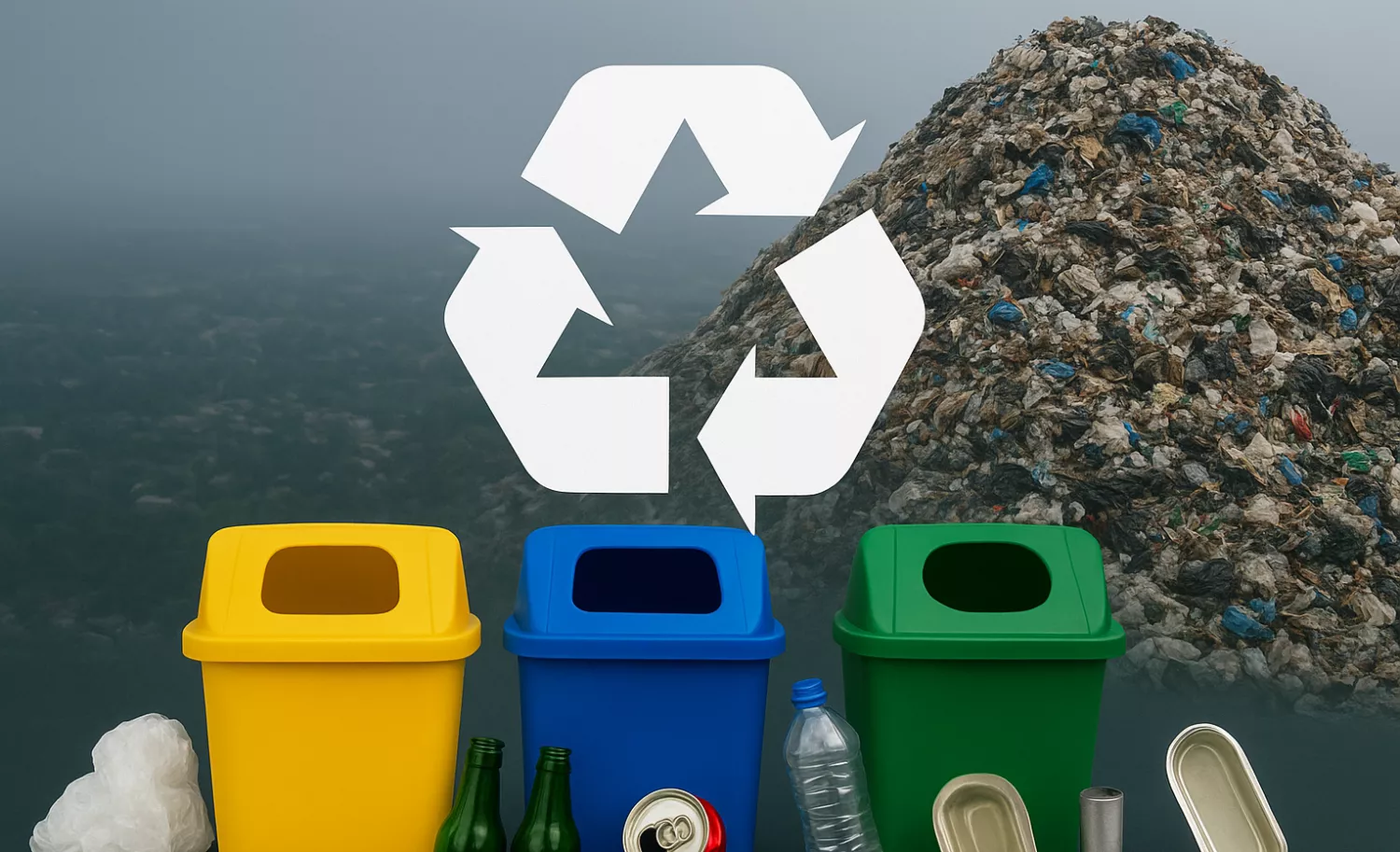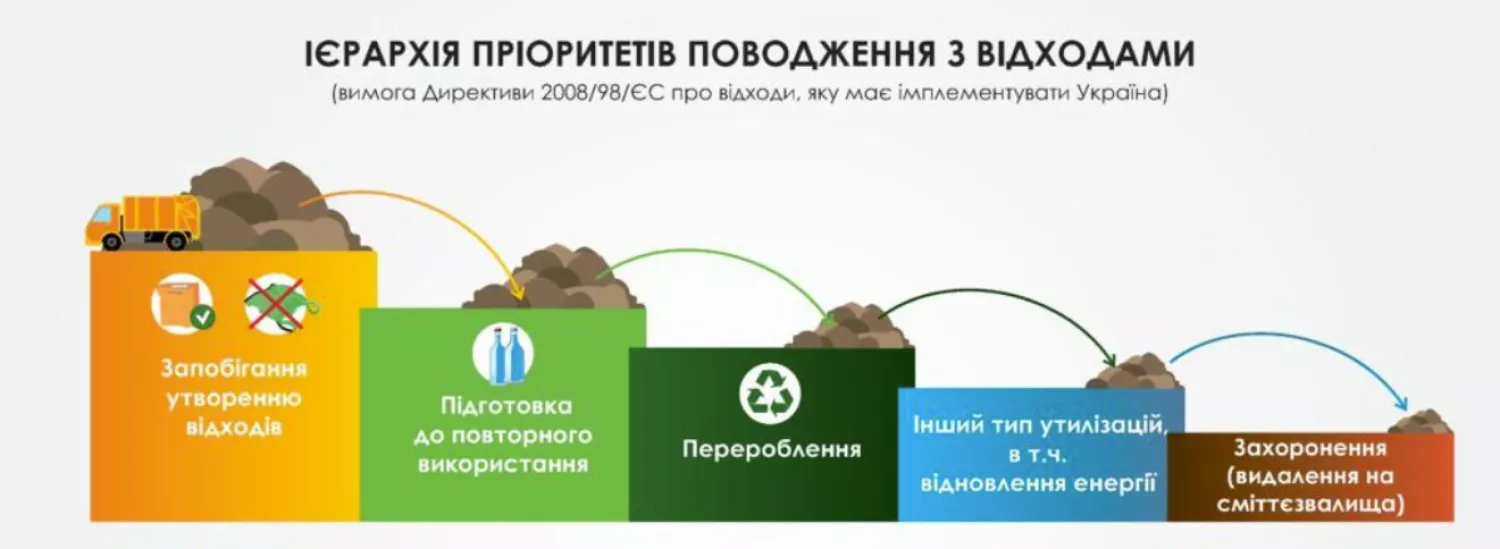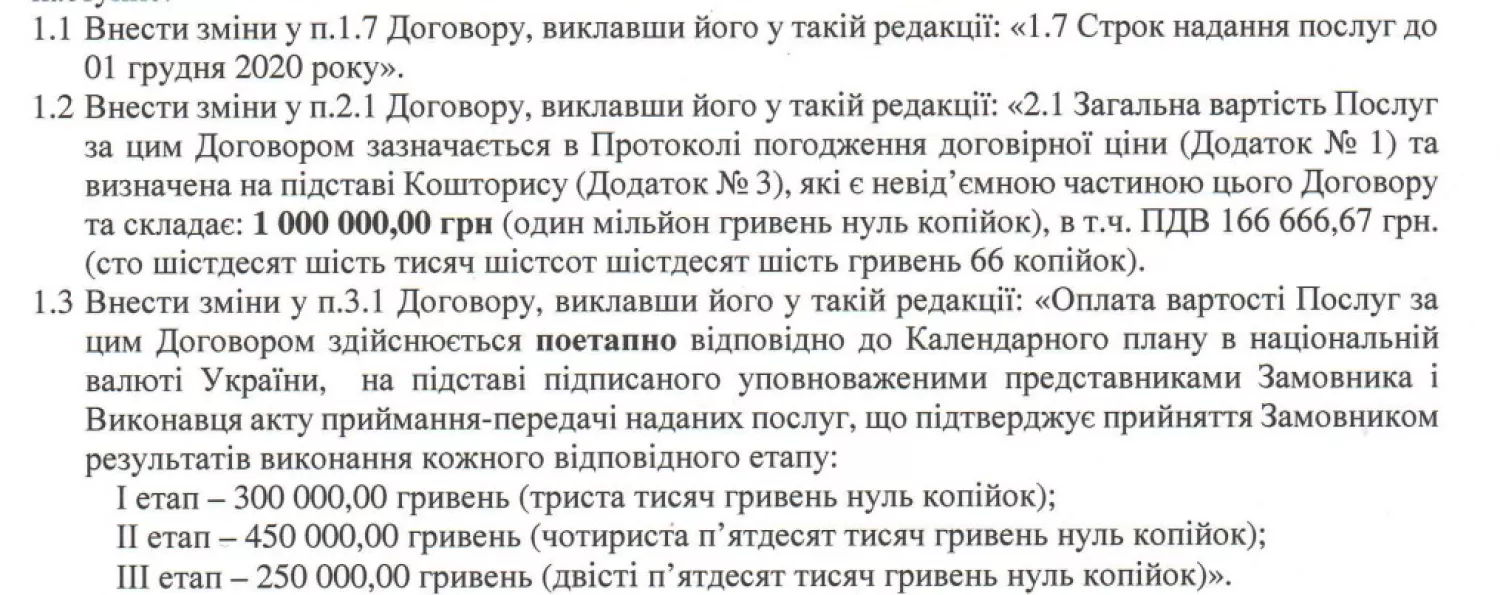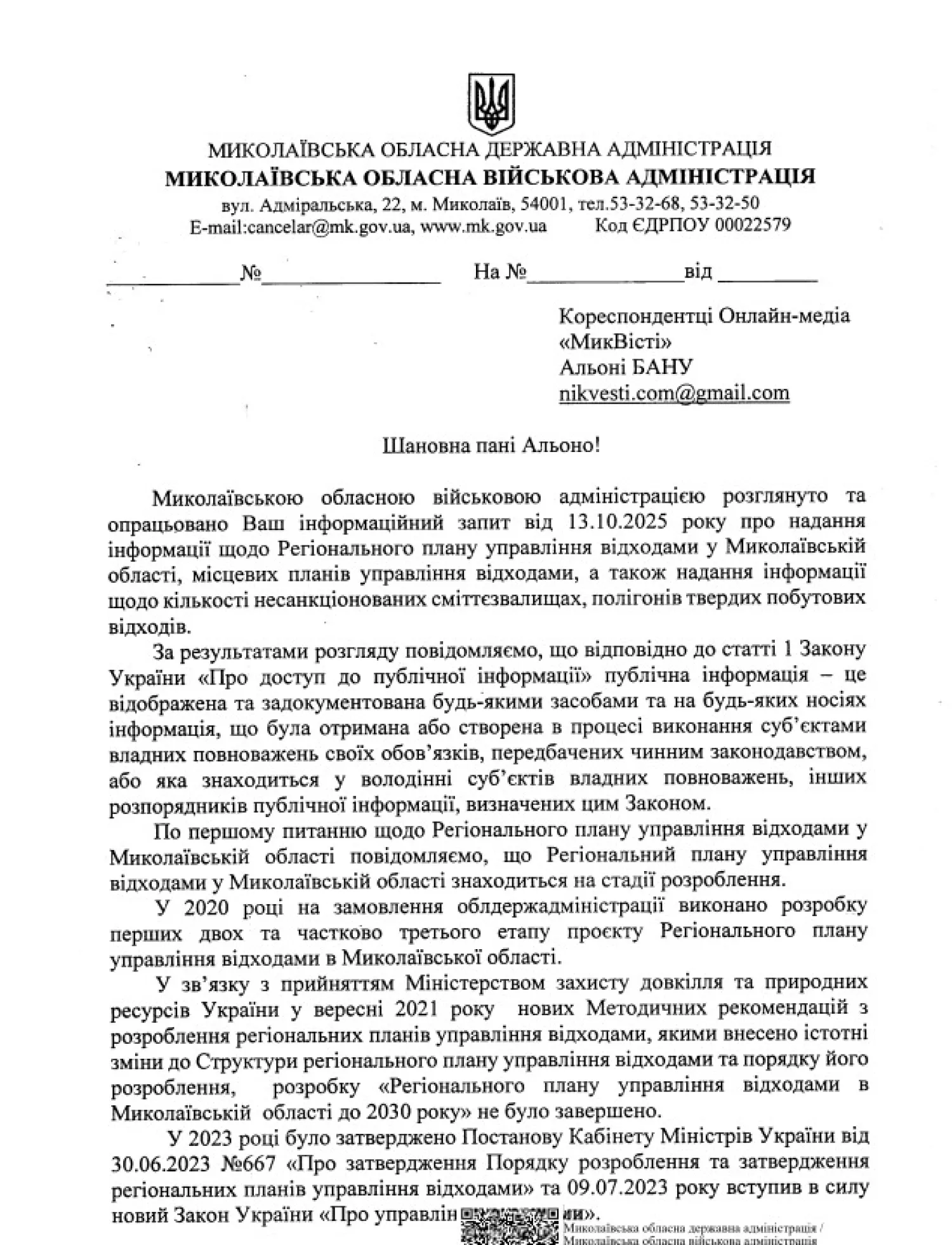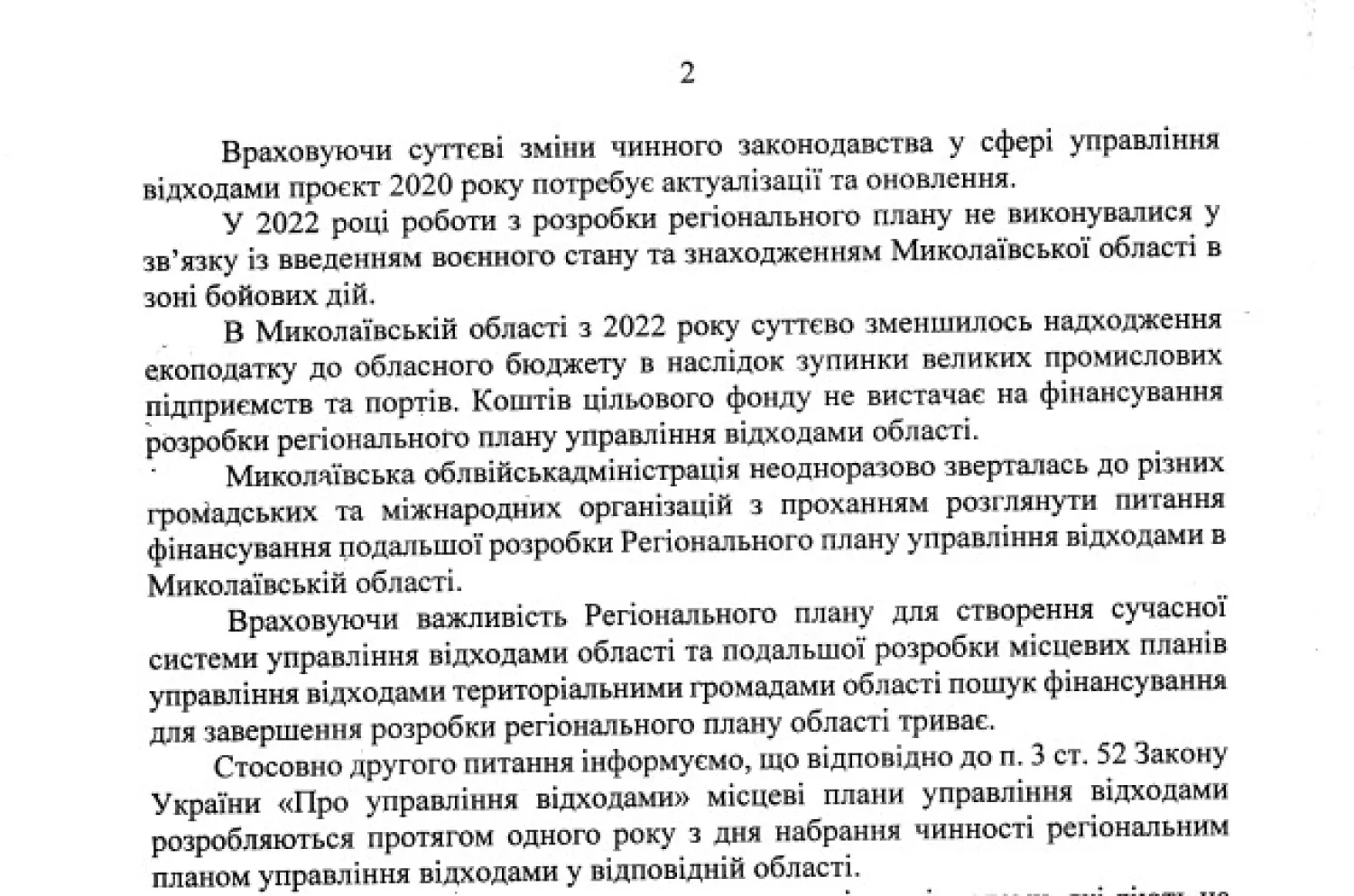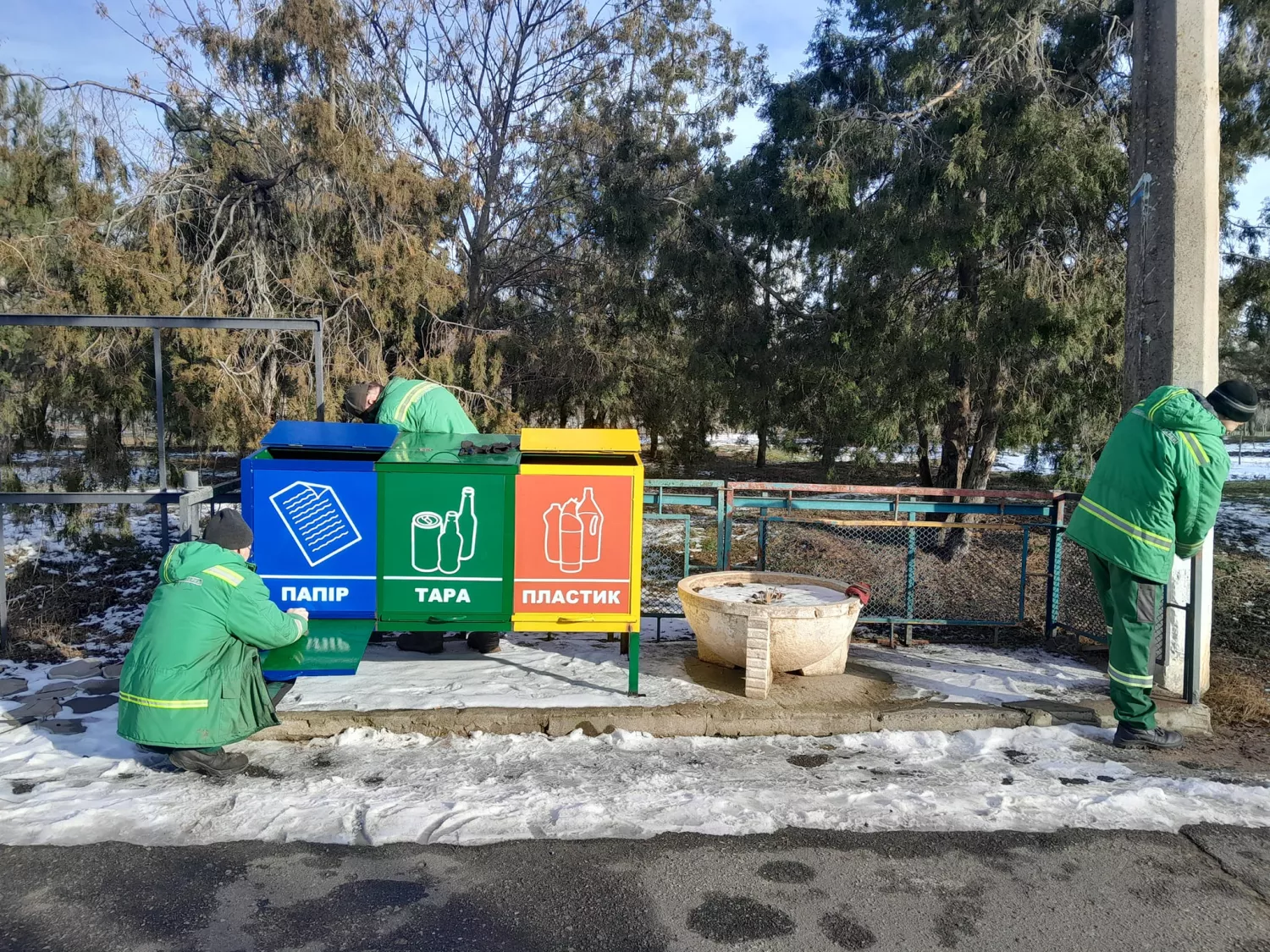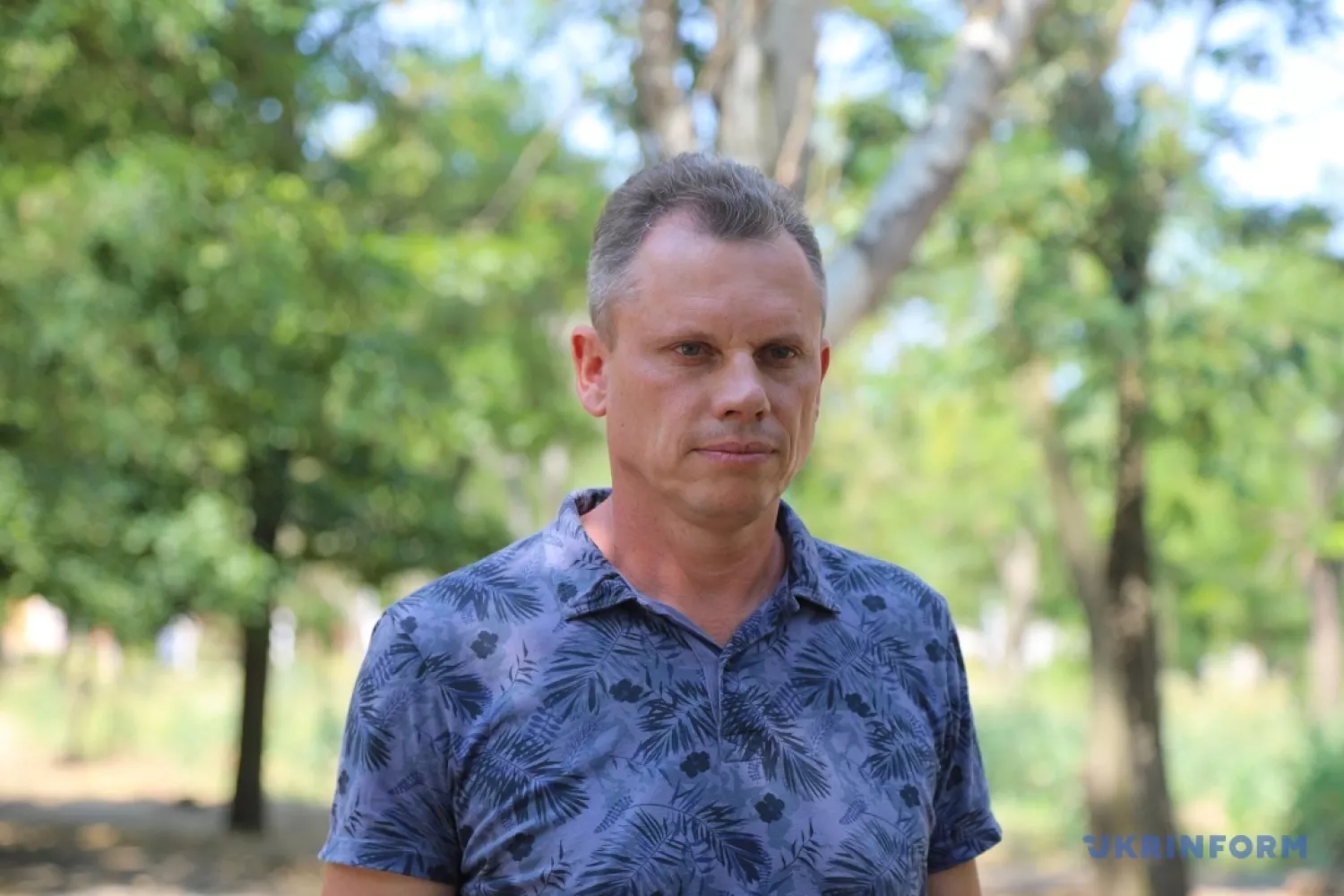From Reform to Reality: How Mykolaiv Region Struggles with Waste without a Regional Plan
- Alona Kokhanchuk
-
•
-
13:40, 03 November, 2025
Every year, hundreds of unauthorised landfills are discovered in the Mykolaiv region. Many of them have existed for decades. But after the launch of the waste management reform, the situation was supposed to change, as new requirements for utilities were introduced and control over waste removal was tightened.
NikVesti found out what has changed with the adoption of the law on waste management, how it has affected the Mykolaiv region, and how many landfills have been eliminated.
Waste management reform: how Ukraine is moving towards a modern waste management system
Ukraine is gradually changing its approach to waste management. In July 2023, a new law «On Waste Management» was adopted, which launched a large-scale reform of the industry — one of the most important environmental reforms in the last decade.
The main goal of the reform is to move from chaotic waste accumulation to systematic waste management in line with European standards. The law lays the foundation for a new model where each tonne of waste has its own accounting, route and further fate.
Among the key changes:
- A unified waste register. Now all companies that generate, transport or dispose of waste must register in a special electronic system. This will help to see where the waste goes — from the moment it is generated to recycling or disposal.
- Regional waste management plans. Each region should create its own plan: where to collect waste, how to sort it, where to take it for recycling. This will help streamline the system and make it transparent.
- Separate waste collection. The reform encourages communities to install sorting containers — separately for glass, plastic, paper, organics, etc. Less mixed waste means less pressure on landfills.
- Combating illegal landfills. All illegal dumpsites should be entered into a register, after which the authorities are obliged to remove them and prevent new ones from appearing.
- Local responsibility. Communities are now responsible for the full cycle of waste management — from collection and sorting to removal and recycling.
Ideally, the reform should create a closed waste management cycle in which every citizen sorts waste, the community organises its separate collection and transfers it for recycling, businesses pay for packaging disposal on the principle of extended producer responsibility, and landfills accept only waste that cannot be recycled.
In this way, Ukraine is moving closer to the European model, where waste is not seen as garbage but as a resource.
Mykolaiv region lacks funds to develop a waste management plan
Kherson region has become the first region in Ukraine to develop and approve an updated regional waste management plan until 2034, in accordance with the new Law «On Waste Management». The plan was approved by the Ministry of Ecology and the Ministry of Infrastructure. It was created over a year with the participation of experts, scientists and community representatives.
The document envisages a cluster approach, the development of modern infrastructure, more efficient use of resources and a gradual transition to the European model of waste management. According to Dmytro Butrii, deputy head of the regional administration, despite the difficulties caused by the occupation, the region was the first to complete this process in accordance with the new requirements.
In the Mykolaiv region, however, there has been no waste management plan since 2020. Work on the creation of a new document began even before the introduction of the new legislation, but there is no ready-made plan yet. In 2020, the Department of Ecology ordered the creation of this plan for more than 2 million hryvnias. The tender was won by the Lviv-based company «INTEROIL SERVICE», which agreed to fulfil the order for 1.85 million hryvnias.
The plan was supposed to be developed in five stages, but it never came to fruition. Due to lack of funds, the budget was cut and the scope of work was reduced. As a result, the region paid about a million hryvnias for only two stages and part of the third. The regional administration never received a fully finished document.
The National Waste Management Plan until 2033 came into force on 27 December 2024, and the regions were given a year to approve their plans. However, Mykolaiv region will not receive an updated waste management plan this year. Due to changes in waste legislation, the project needs to be updated and finalised.
«We discussed this issue with the head of the ecology department, and I don't think it's possible to finalise such a serious document in two months. Of course, almost three sections have been completed, but there have been changes. The document contains analytical information», comments Alla Riazhskykh, a deputy of the Mykolaiv Regional Council and chairman of the Mykolaiv Regional Council's Commission on Ecology and Environmental Protection.
In turn, the Mykolaiv Regional Military Administration reported that since 2022, environmental tax revenues to the budget have significantly decreased in the region. This happened due to the shutdown of large industrial enterprises and ports. Due to the lack of funds in the trust fund, the region cannot finance the development of the Regional Waste Management Plan.
Therefore, the administration is now looking for funds to develop the document and is asking various NGOs and international organisations to help.
«The Mykolaiv Regional Military Administration has repeatedly appealed to various NGOs and international organisations to consider funding for the further development of the Regional Waste Management Plan in Mykolaiv region. Given the importance of the Regional Plan for the creation of a modern waste management system in the region and the further development of local waste management plans by the territorial communities of the region, the search for funding to complete the development of the regional plan is ongoing. The regional military administration has already appealed several times to civil society and international organisations to support the financial completion of this document», the RMA said.
The regional plan is the basis for building a modern waste management system. Without its completion and approval, communities will not be able to plan work in this area and implement modern environmental solutions.
What is happening with landfills in Mykolaiv region
In recent years, the number of official solid waste storage sites in the Mykolaiv region has not changed. As of 2025, there are 267 landfills in the region with a total area of 524.4 hectares.
According to «Regional Report on the State of the Environment in Mykolaiv Region for 2024», landfills in the region are filled by an average of 53%. In cities, the situation is worse — over 85% full. Three landfills are already overloaded — in Voznesensk, Pervomaisk and Pivdenoukrainsk. The total area of these landfills is almost 20 hectares.
It is also noted that local authorities often do not have proper documents for the land where landfills are located. Not all landfill sites have landfill passports, which are official documents describing their condition and operating conditions.
Currently, only cities have sanitary and technical passports for landfills: Mykolaiv, Voznesensk, Ochakiv, Pivdenoukrainsk, Snihurivka and in Luhove village of Kobleve territorial community.
Sanitation schemes have been approved in 262 settlements in the region. However, most of them were developed without the involvement of experts, so they need to be updated in accordance with the new laws and the conditions of the communities.
According to the Mykolaiv Regional Military Administration, in 2024, 7 million 563 thousand 525 hryvnias was allocated for the development of solid waste management in the settlements of Mykolaiv region. These are funds from local budgets and other sources.
2 million 330 thousand hryvnias was allocated to upgrade garbage containers. This money was used to purchase 188 garbage containers in Voznesensk, Pivdennoukrainsk and Pervomaisk. In addition, the Pivdenoukrainsk community purchased one bulldozer with a blade and a ripper. The cost is 5 million 233 thousand hryvnias.
Thanks to the cooperation of the Danish Embassy and the United Nations (UNOPS), in May 2024, Mykolaiv region received three Ford garbage trucks. They were handed over to the Ochakiv, Voskresenske and Mishkovo-Pohorilove communities. In August, the region received three more JCB 3CX excavators for the Voskresenske, Olshanske and Mishkovo-Pohorilove communities and two forklifts for the Olshanske and Mishkovo-Pohorilove communities.
Elimination of landfills
The new waste management reform in Ukraine aims to minimise the amount of waste that goes to landfills, where it will remain for years. This can be done by implementing modern approaches: waste sorting, recycling and reuse. Separate waste collection can reduce the volume of waste by about 30-40%. This means that landfills will last longer and new ones will not have to be built as quickly.
However, the reality is quite different from the plans and prospects. Waste sorting is still a novelty for most residents of the Mykolaiv region. According to the Department of Housing and Communal Services of the Mykolaiv Regional State Administration, as of 1 January 2025, the situation with separate waste collection in the cities that are leaders in the total volume of waste generation and accumulation is as follows:
- Mykolaiv — 65.2% of the population covered by separate household waste collection.
- Voznesensk — 61.7%.
- Ochakiv — 100%.
- Pervomaisk — 10.2%.
- Pivdenoukrainsk — 26.5%.
There are no waste recycling or sorting plants or technologies in the cities and villages of the region. Such technologies are available only in Kyiv and Kharkiv. Because of this, it is very difficult to reduce the amount of waste that is taken to landfills.
Therefore, while there are only plans to sort and recycle waste in the region, it remains to fight against unauthorised dumpsites to somehow reduce environmental damage and prevent further pollution of the territories.
The State Ecological Inspectorate of the South-Western District is fighting illegal dumps in Mykolaiv region. In response to a request from NikVesti, they said that due to martial law and a government decree of March 2022, state control over the environment was significantly reduced.
Nevertheless, local authorities were obliged to inspect territories, identify unauthorised landfills, clean them up and prevent new ones from appearing. Local governments must also provide sanitary cleaning and ensure that businesses and citizens comply with waste management rules.
In 2024, 399 landfills with a total area of over 59 hectares were cleaned up in the region:
- 55 waste dumpsites with a total area of 9,553 hectares in Bashtanka district
- 219 waste dumpsites with a total area of 28.105 hectares in Voznesensk district;
- in Mykolaiv district — 111 waste dumpsites with a total area of 7,478 hectares;
- in Pervomaiskyi district — 208 waste dumpsites with a total area of 14,132 hectares.
As of 5 October 2025, 1,059 landfills with a total area of 54.6 hectares have been eliminated in Mykolaiv region. Most of them are in Mykolaiv and Voznesensk districts. The total number of dumpsites eliminated:
- 64 waste dumps with a total area of 12.38 hectares in Bashtanka district;
- 240 waste dumpsites with a total area of 33.587 hectares in Voznesensk district;
- in Mykolaiv district — 700 waste dumpsites with a total area of 6,668 hectares;
- in Pervomaiskyi district — 55 waste dumpsites with a total area of 1.99 hectares.
The Eco-Inspectorate continues to collect data from communities and checks how local authorities fulfil their waste management responsibilities.
A waste sorting and recycling facility is to be built in Ochakiv
Despite the fact that Mykolaiv region does not yet have an approved regional waste management plan to guide communities, some of them are not waiting and are already developing their own updated waste management plans. One of them is Ochakiv community.
The community's household waste management programme was approved until 2030. It was supported by the deputies at a session meeting on 17 October 2025. The community wants to approve clear waste accumulation standards for homes and businesses, create a new scheme for sanitary cleaning of the city and set tariffs for waste removal that will cover real costs.
It is also planned to repair the landfill: to arrange entrances, to bring in water, and to carry out reconstruction and reclamation. In addition, the city intends to upgrade containers, garbage trucks and special equipment. But most importantly, Ochakiv plans to build a modern waste sorting and recycling facility.
The approved document states that almost 88% of Ochakiv residents receive garbage collection services. However, the city council notes that some waste remains out of control due to imperfect regulations that should oblige condominiums and enterprises to enter into contracts for waste removal.
Another problem is the lack of funds: tariffs do not cover real costs, and budget money is not always enough for new equipment, landfill reconstruction and container upgrades. The municipal enterprise «Ochakiv-service» has too few modern garbage trucks, and there are only 649 garbage containers in the city — not enough, especially for separate collection
Deputy Mayor Oleksii Vaskov says that the local landfill is at the level of «the last century» and needs to be updated. It was opened back in the 1980s, and as of now, 79% of the projected volume of waste has been accumulated there.
«We have a landfill, and we dispose of waste there, but this is still the level of the last century, compared to Europe today. We have no waste recycling plant, no sorting lines. We sort plastic separately on our own and if people throw it into separate containers,» says Oleksii Vaskov.
It is difficult to build a new modern landfill in the city because there is no free land, and agricultural plots are too expensive. Therefore, a project is currently being developed to launch a sorting line at the existing landfill. The city needs about 20 million euros to implement the plan.
«We are working now, we already have a project in place. We are now working with international partners to install a sorting line: biowaste, glass, iron, plastic, paper. In general, the sorting line will be for 5 types of waste. This project will cost the city about 15-20 million euros. It will be international assistance, I hope. Most likely, it will be some kind of grant and loan from the EBRD or EIB,» says the deputy mayor.
The community does not yet know how the waste sorting and recycling complex should work. They are currently studying the needs of the community in order to have technical conclusions on the basis of which the complex itself will be built.
«I was abroad, saw this line, shot a video, and talked to the designers. Now we are providing them with technical conclusions about our needs, i.e. the morphology of waste, its quantity, supply, the possibility of installing the line, and the available area. They take this data and start working. And they give us an explanatory note to the project. That is, that it is possible to do this, it will be such a line, it will be such a sorting, it will cost so much. Please order the project. You can order from them abroad, you can order from us,» says Oleksii Vaskov.
In total, by 2030, Ochakiv plans to finance the programme's activities for more than 64 million hryvnias to bring the solution to the problem of household waste management closer and reduce its impact on nature.
Transition to the European model
Ukraine is on the verge of changes in waste management. We still landfill more than 90% of our waste, while in the EU this figure is much lower. The waste problem has been ignored for years, and the war has only exacerbated the situation by adding thousands of tonnes of construction and hazardous waste.
The new law «On Waste Management» launches the European model — sorting, recycling, reuse. This means abandoning chaotic landfills and moving to a circular economy where waste becomes a resource.
To make this a reality, we need not only laws, but also infrastructure, funding, control and support from communities. Ukraine has a unique opportunity not only to catch up with Europe but to build a modern waste management system right now. And we can no longer lose this chance.
Alona Kokhanchuk, NikVesti
